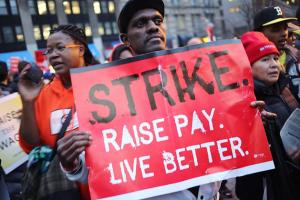For neoliberalism to truly end, austerity and privatization must also come to an end and universal public programs such as nationalized healthcare and free higher education must exist within a context of peace.
“A massive increase in the standard of living of workers and oppressed people must occur before neoliberalism can be declared ‘dead.’”
Since Biden announced upwards of $6 trillion in federal spending priorities last April, including $2 trillion for new infrastructure, a range of economists and media outlets in the United States have sounded the death knell for neoliberalism. The logic is simple. Biden’s proposals raise federal expenditure to a level not seen since World War II. Instead of seeking corporate leadership to fund increased spending, the Biden administration has verbally committed to tax increases on the wealthy.
Trillions in new federal spending proposals excited some Democrats who agreed with Bernie Sanders’ assertion that Biden would represent the most progressive U.S. president since FDR. Such excitement was always misplaced. While Biden has committed to passing some version of his proposals, he has also demonstrated an obsession with bipartisanship. Negotiations with Republicans have already yielded significant concessions including a $1 trillion reduction in his infrastructure plan.
What form Biden’s proposals will ultimately take remains unclear. Republicans may no longer possess a political majority in Congress but inevitably benefit from the Democrats’ willingness to compromise the needs of their base to satisfy the capitalist class in control of both major parties. It is therefore necessary to revisit a key aspect of the Marxist philosophy of materialist dialectics: the struggle between appearance and essence.
“Negotiations with Republicans have already yielded significant concessions.”
Materialist dialectics explain the development of political economy in terms of contradictions, or a struggle between opposites which is in constant motion and rooted in the material world. Capitalists cannot exist without exploited labor, racism cannot exist without an oppressed race and an oppressor, and so on and so forth. How these contradictions ultimately change is by no means linear and is shaped by conflict—both in the form of objective developments within the overall system and the subjective efforts of social classes to assert or reinforce their interests (a contradiction in and of itself).
Appearance refers to what is readily visible to the naked eye. The essence of any phenomenon, especially a social system such as capitalism, is generally shrouded in an ongoing struggle between the hegemony of the dominant class and the material reality of the exploited classes. Biden’s federal spending plan, for example, appears to be a departure from neoliberal orthodoxy of the past two generations. The essence of Biden’s budgetary priorities, however, is firmly grounded in neoliberalism.
Neoliberalism is generally defined as the placement of the private marketplace in command of society. This takes the form of tax reductions, austerity measures, and the full-scale privatization of state functions. Such a definition is limited to the appearance of the capitalist system and often disregards its essence. The diminishment of public assets and labor power is an important aspect of neoliberalism but does not reflect the essence or the quality of the system itself.
“Biden’s budgetary priorities are firmly grounded in neoliberalism.”
In essence, neoliberalism is an epoch of capitalism whereby the general crisis of the system is mitigated by the increased enrichment of capital at the expense of the people and the planet. In 2007-08, the United States addressed economic collapse by empowering finance capital through trillions worth in bailout dollars. Federal debt was used as an excuse to target public entitlements such as Medicare and Social Security. The Obama administration worked diligently with Republicans to privatize schools and pass a law that solidified the role of for-profit insurance companies in the administration of healthcare.
It is important to remember that Biden entered the Oval Office amid an unprecedented crisis in the history of capitalism. The world was (and still is) struggling with a deadly pandemic that triggered a history-altering economic crisis. Biden’s spending plans represent the bare minimum of what is required of the capitalist class to remedy a fraction of the economic damage caused by the U.S.’s failed pandemic response. While comparative to World War II numbers in aggregate spending, Biden’s proposals will only increase public investment in production by 0.5 percent of overall GDP, from 3 to 3.5. Private corporations and banks remain in the driver’s seat of investment and production.
The essence of neoliberalism is reflected not only in the quantity of public expenditure but also in its quality. Neoliberalism is defined both by the expansion of capital’s supremacy and the limitation of what is possible. A massive increase in the standard of living of workers and oppressed people must occur before neoliberalism can be declared “dead.” The last real rise in the standard of living of workers in the United States occurred following World War II when a combination of worker organizing and federal investment in jobs led to an increase in the social wage, albeit at the relative exclusion of a large portion of Black America, Indigenous people, and people of the Global South.
“Biden’s proposals will only increase public investment in production by 0.5 percent of overall GDP.”
The same cannot be said about Biden’s proposals and whatever negotiated form they may take in the future. On the campaign trail, Biden promised to cancel student loans, implement a public option, and raise the federal minimum wage to $15 dollars per hour. All of these proposals have been left out of debates over federal spending. Also left out is a jobs guarantee and a change in labor law—both of which are necessary if the condition of labor is to improve and the balance of power is to shift from the capitalist class to workers. Instead, Biden has requested the largest military budget in U.S. history at $753 billion to further satisfy the profits of military contractors.
Massive infusions of federal dollars alone do not alter the essence of neoliberalism, especially when a large portion of them will go to bolstering the New Cold War on China economically and militarily. Thus, it is premature if not dangerous to declare neoliberalism dead just because the Biden administration has been forced to increase federal spending. To do so is an exercise in political dishonesty and offers a window into how low expectations have become.
For neoliberalism to truly end, austerity and privatization must also come to an end. Universal public programs such as nationalized healthcare and free higher education must exist within a context of peace. White supremacy must be uprooted from the base of society. Neoliberalism thrives on social chaos and disaster, but the COVID-19 pandemic has exposed how even the most rapacious stage of capitalism has its limits. Mistaking these limits for the death of the system itself only places further barriers in front of what is truly needed to bury neoliberal capitalism in its grave: a mass movement led by workers and oppressed people that is armed with demands and a sound strategy for exerting the necessary pressure on the state to either comply with the aspirations of the masses or face significant consequences.
That is the true definition of power to the people.
Danny Haiphong is a contributing editor to Black Agenda Report and co-author of the book “American Exceptionalism and American Innocence: A People's History of Fake News- From the Revolutionary War to the War on Terror.” Follow his work on Twitter @SpiritofHo and on YouTube as co-host with Margaret Kimberley of Black Agenda Report Present's: The Left Lens. You can support Danny at www.patreon.com/dannyhaiphong.
COMMENTS?
Please join the conversation on Black Agenda Report's Facebook page at http://facebook.com/blackagendareport
Or, you can comment by emailing us at comments@blackagendareport.com



















